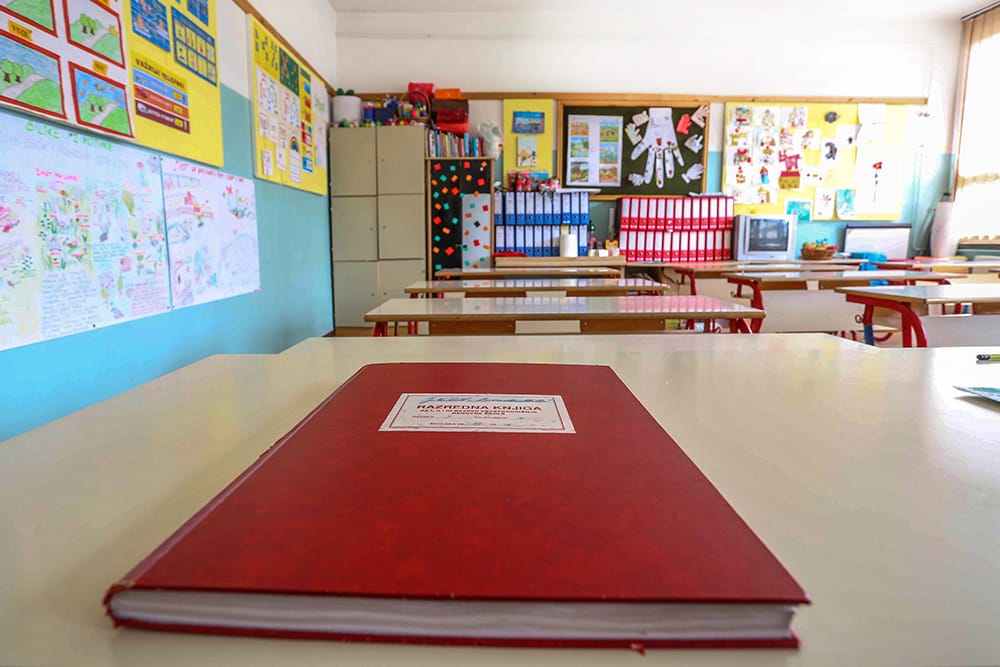The Vuk Karadžić Secondary School Center in Lopare launched disciplinary action against the PE teacher Velibor Vujić after CIN reported on teachers who continued to work in education after being convicted of sexual harassment of minors.
Reporters discovered that 35-year-old Vujić from Bijeljina was one of at least seven educators in Bosnia and Herzegovina who in the last ten years remained on the job after being convicted.
In March 2021, he was convicted of sexually harassing a minor student at the Mihajlo Pupin Secondary Technical School in Bijeljina but after the conviction, he continued to work at Veljko Čubrilović Elementary School in Priboj and Vuk Karadžić Secondary School in Lopare.
The principal of the Lopare School, Mićo Stojišić, told CIN earlier that he did not know about the verdict, nor was the school officially informed about it. The school’s disciplinary action followed only after the Children’s Ombudsperson Ms. Gordana Rajić informed the Ministry of Education and Culture of the Republika Srpska of this case prompted by the CIN’s story. The Ministry ordered the school to “take appropriate measures” and act “by the law”.
“Unfortunately, laws are not a guarantee that protection will be provided. Therefore, it is very important to closely monitor the application of regulations in practice and to point out shortcomings in order to remove all obstacles to ensuring effective protection of children”, says Ombudsman Rajić.
As principal Stojišić said, the process against Vujić will take longer because he refuses to cooperate. He did not respond to calls from CIN reporters.
The Veljko Čubrilović Elementary in Priboj terminated Vujić’s employment for these well-known reasons, but he has already twice won a court case against the school due to procedural errors in terminating his employment contract. The legal procedures are mandatory and foreseen [under law], and unfortunately, they also take time, but we must comply with the law in order to avoid facing a similar situation”, says Vuk Karadžić Secondary School.
In the Republika Srpska, there is a Register of persons convicted of criminal offenses of sexual abuse and exploitation of children, but principal Stojišić says that the Bijeljina police informed the school that Vujić was not in this database.
The register is maintained by the RS Ministry of Internal Affairs, and to check any person in the register, one needs to file a request with this Ministry. This institution ignored the CIN’s request to check if Vujić was in the database.
Given that practice has shown problems in maintaining this data, the Children’s Ombudsman Institution and the RS Ministry of Education and Culture made a proposal to amend the Special Register Act, the amendments of which should be discussed by the RS National Assembly in mid-March 2023.
According to these amendments, the Register would also contain the persons whose criminal record is not maintained by the competent authorities of the RS, but whose domicile or residence is in this Entity.
In its investigation from late 2022, CIN discovered that another professor in the Republika Srpska continued to work in education after being convicted.
Former professor and principal of Đački dom Davor Vidaković in Doboj was convicted in 2018 and sentenced to a four-month prison term for abuse of position. After that, he continued to work as a professor at the Faculty of Computer Science in Istočno Sarajevo, Banja Luka University of Business Engineering and Management (PIM).
Dragan Mitrović, the founder of the Business Engineering and Management Department in Istočno Sarajevo, told CIN that Vidaković presented a no-conviction certificate to the Faculty in the recruitment process.
The Children’s Ombudsman Institution did not react in this case because it is about a convict who no longer works with minors, but teaches at a higher education institution.
The RS Higher Education Act prohibits the recruitment of persons who have been convicted of a crime against sexual integrity. The Act also mandates that higher education institutions terminate the employment contract of teachers who have been convicted of these criminal acts.
Even though CIN reporters presented to the Faculty proof that Vidaković was indeed convicted, PIM failed to react.
CIN wrote about the higher education institutions that avoid taking disciplinary action for sexual harassment, a crime punishable by dismissal. In recent years, female students from BiH have testified about the immorality of professors, accusing them of multiple sexual harassments, but public universities and the BiH judiciary are deaf to their confessions. Of the 53 persons who were reported to the BiH Prosecutor’s Office for sexual harassment in the past decade, only five were convicted.







